Remembering Edward Mosberg
Holocaust survivor first kept silent, but knew he had to speak
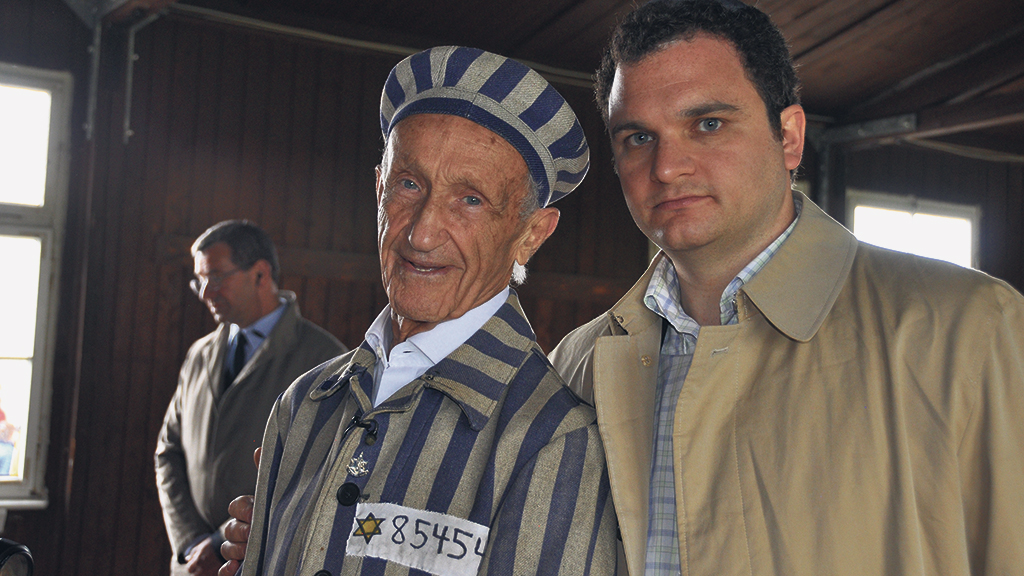
Edward Mosberg’s life could be divided into four parts, although it’s fair to add that they bled into one another. (And given his life, bleed is the correct verb.)
In the first part of his life, Mr. Mosberg, who lived in Parsippany and died on September 21, at 96, had a normal, happy childhood in Krakow, the brother of two sisters, Halina and Karolina, the son of a wealthy family whose parents, Bronislawa and Ludwig, owned a flourishing department store.
Then the Nazis came, life narrowed, and Chapter 2 of Mr. Mosberg’s life began. The extended family was pushed from their many spacious apartments to one, in the ghetto. Ludwig Mosberg had been a commissioned officer in the kaiser’s army during World War I, his grandson, Barry Levine of Morris Plains, said. Ludwig Mosberg had lived in Vienna until he got married, at the then-late age of 30, and “was a proud citizen of the Austro-Hungarian empire.”
The men in the family — Edward Mosberg — Edziu, as his family called him — his father, his uncle, and a cousin – decide to run away from Poland because they’d heard a rumor that the Germans were rounding up men. “But they were sure that the women would be safe,” Mr. Levine said. “After all, they” — the soldiers rounding up Jews — “were German.” That is to say, they were civilized.
“They were so ignorant about what would happen,” Mr. Levine continued. “They ran toward what today is Ukraine — my great-grandfather had a sister there.” Because history had not yet stripped their naiveté from them, “my great-grandfather enrolled my grandfather in school there. For a little while, they lived with his aunt and uncle and cousins.
“And then the Nazis took over the area, and they rounded up the men, and shot them.” Ed’s father was among the men murdered there.
“Somehow my father communicated with his mother, and he told her that his father was dead.” Because they still did not know what was coming, mother and son decided that he should rejoin the family in Krakow.
“They had a relationship with a Polish Christian, who had been a member of the police department in Krakow, and my great-grandmother bribed him to get my grandfather back to Krakow.”
Here, unsurprisingly, it helped to be rich. “My great-grandmother,” Beila Blumenkranz Mosberg, “was a wealthy woman,” Mr. Levine said. She loved jewelry, and she had a lot of it. “A friend told my great-grandmother that with her diamonds — just with her diamond earrings — she could survive the war. With her diamonds, she’d be fine.
“So she used some of her jewelry to smuggle her son back to the Krakow ghetto, using the non-Jewish man’s son’s identity papers.”
So that was fine. The two men, play-acting father and son, found themselves on an overnight train that was transporting troops back to Krakow. “It was packed,” Mr. Levine said. “Standing room only. Including in the latrine.”
The problem that arose overnight was a predictable one. Ludwig Mosberg needed a bathroom, and the only one of the train was full of passengers with no place else to stand. Mr. Mosberg was circumcised, as very few non-Jewish European men were at the time. What could he do? “But the Polish man was an officer, and he knew that everyone who was standing in the latrine was low on the totem pole, so he said, ‘My son has to use the bathroom, and my son will not be subject to the indignity of having to do that with all you men here watching him.’”
The rank-pulling worked. The other men left the nasty, cramped toilet room. “If any of those men had challenged him, and had seen that my grandfather was circumcised, both of them would have been dead,” Mr. Levine said.
“My grandfather said that he was reunited with his mother, his aunts, his sisters, and his grandparents, and they were happy together,” he continued. “Did they also have issues with each other? Of course they did. But they were happy to be together.”
In 1943 the Nazis invaded the ghetto and sent the survivors to work or concentration camps. The Mosbergs were sent to a labor camp at Plaszów, where Edward worked for Amon Goeth, whose atrocities were horrific even by Nazi standards, and who was tried, convicted, and hanged as a war criminal after the war was over. Next, Edward’s sisters and mother were deported to Auschwitz, where they were murdered; Edward was sent to Auschwitz and then to Mauthausen, and he survived.
When he was in Plaszów, Eddie Mosberg met a young woman named Cecile Storch (Cesia, to her friends, both in Poland and later in the United States). This was toward the beginning of their nightmare, and life already horrific for them, although it would get much worse; despite that, the two almost managed to meet cute. “My grandfather was on a work detail with other teenagers,” Mr. Levine said. “They were sorting through the belongings of Jews who had been slaughtered, and they heard that more workers were being brought it. Everyone ran to the window to see who the new workers were.” Sounds like normal teenagers, right? “And someone screamed ‘Ohmygod! That’s my sister.’
“That woman became my great aunt.”
Eddie and Cecile were separated; she survived even more concentration camps than he did, Mr. Levine said. “By my grandfather’s own admission, she had a worse experience than he had.”
After the war, Eddie and Cecile met again and married, twice; the first time in Krakow, “by the shammes of the synagogue that my grandmother’s father went to, but they wouldn’t have a civil ceremony there, in Poland,” he said. They moved to Belgium, lived there for the year that was mandatory before a civil ceremony was allowed, and then had that second ceremony.
In 1951, with their first child, infant Beatrice, they moved to the United States.
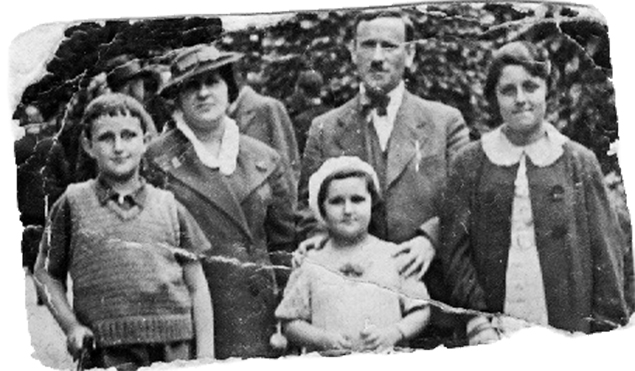
big sister, Helena.
That was the beginning of Mr. Mosberg’s third chapter.
The family lived in East Harlem, where Eddie undertook a variety of jobs. Because a great aunt had married into a family that owned theaters, he was given a job in one of them; because that great aunt’s sons were not generous or kindly men, that job was as a ticket-taker, at five cents an hour. (Even then, that was not a livable salary.) “My grandmother’s great aunt was very kind,” Mr. Levine said, and she had no idea what her sons had done. “She invited them to lunch at her apartment in the Waldorf.” It was odd, he said.
But “my grandparents had other relatives who were exceptionally generous, and kind to them. My grandfather later worked in the summer in Grossingers, in the Catskills, and he worked as a jeweler, and slowly he started achieving some success.
“In 1959 he got in touch with his friend Harry Wilf, whom he’d met in postwar Europe.” After turning down a job with Harry and his brother Joseph, then in the used car business, that would have had him driving used cars from New York to Detroit, he joined them in their real estate venture. From then on, the family flourished.
Mr. Levine’s mother, Louise Mosberg Levine, was born in 1953, and the youngest sister, Caroline Levine Karger, was born in 1966.
One other immediate family member survived the Shoah. Although Cecile Mosberg’s mother, Hannah Rosenbaum Storch, was murdered in the Holocaust, her father, Leib Storch survived, and made aliyah to Israel. “He died peacefully in Israel in 1972,” Mr. Levine said.
During most of their American lives, neither Cecile nor Eddie Mosberg talked about the war.
“When I was a child, about 4, 4 1/2, maybe 5, I noticed that my grandmother had a number on her arm,” Mr. Levine said. “I was a kid. I was curious. I said, ‘Nana, what is this number?’ She said, ‘It’s nothing.’ I said, ‘No, what is it? Why do you have it? Why doesn’t it wash off?’ I was a Jewish kid. What did I know about tattoos.
“She finally said, ‘It’s my friend Mila’s phone number.’
“That didn’t sound right to me. So I asked my mom, and she said that there were these people, these Nazis, who did terrible things to your grandparents and their friends, and they killed a lot of them. And she said, ‘Don’t talk about it with your grandmother, because it makes her really upset.’
“So I held off for as long as I could — I was a 4-year-old, so that wasn’t very long — and then I asked again, but she didn’t want to talk about it. She just said how much she missed her sisters and brother.”
That desire not to talk about the hell she’d survived stayed with Ms. Mosberg throughout her life — she died in 2020, the month before covid struck — but Mr. Mosberg’s view about it changed over time.
In 1991, when Mr. Levine was in fifth grade at the Hebrew Academy of Morris County in Randolph, as the school now known as the Gottesman RTW Academy was called, his grandfather talked about his experiences at the school for Yom HaShoah. His friend and fellow survivor Maury Pentirer of Livingston joined him; Mr. Pantirer already had begun to talk about what he’d lived through. “They talked to the middle school plus me,” Mr. Levine said. “My grandfather had me sit next to him. And I saw two grown men — physically small, but giants in every other way — cry.”
Many of the school’s students were the children or grandchildren of survivors, Mr. Levine said; most of those survivors had not yet begun to talk about their experiences.
Mr. Mosberg spoke publicly about his experiences one other time during that chapter in his life, Mr. Levine said. It was at the request of one of his lawyers, who was not Jewish, and it was sometime in the mid 1980s. “He called my mom, and said that he was nervous about it, because he didn’t know if anyone would believe him,” Mr. Levine continued. “They were all non-Jews. My mom went with him.
“Everyone believed him. The room was dead silent. Everyone was in shock.”
And then the dam that many survivors had built to keep their memories safely away from their waking hours, and from their lives, and from their relationships, began to burst open. People started to talk.
Mr. Mosberg’s fourth and final chapter was the part of his life where he accepted the responsibility to talk about what had happened to him, to his family and friends, to his community, to the Jewish world. He undertook the obligation to keep the memories raw and alive, to help build toward the goal of never letting it happen again.
There were all sorts of social and psychological underpinnings to that decision, but the catalyst was a movie.
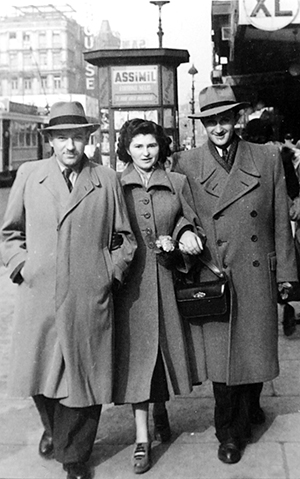
“Schindler’s List.”
“My grandfather felt that it was important for non-Jews to see the movie, and he paid for a number of schools, both Jewish and non-Jewish, to see it.
“I went with him to see it in Headquarters Plaza in Morristown. It was my second time seeing it, and it was his first.
“I sat next to him, and he held my hand for the entire movie.”
The whole film was extraordinarily moving for Mr. Mosberg — as it was for just about everyone who saw it, but particularly for him — but there was one scene that affected him even more than the others.
“People were packed into a transport, into a train, and it was horribly hot. People could barely breathe. And Schindler goes to the train platform, and he directs the Germans to water the cars. Every time the train stopped, he made them water the cars. And he gave them water.”
In the film, as in real life, some of the Jews Schindler had listed as his workers were on that train, by mistake. They were going to Auschwitz, and Schindler got them out. Not all of the Jews on that train were on Schindler’s list, but all benefited from his decency.
That’s something that Edward Mosberg knew firsthand.
“My grandfather was on that transport,” Mr. Levine said. “And he said that until he saw the movie, he never knew that the train was watered because of Schindler.”
Starting a few years later, in about 1996, because of the movie, Mr. Mosberg started talking, and for the rest of his life he never stopped. “He said, ‘I have this obligation. I have to do it,’” Mr. Levine said.
He spoke in schools and shuls and JCCs and other organizations, Jewish and non-Jewish alike. He went back to Poland on the March of the Living. He was part of the Dimensions in Testimony Interactive Biography program from the University of Southern California’s Shoah Foundation, founded by Steven Spielberg. The USC Shoah Foundation recorded his testimony; it’s available and easily findable on YouTube.
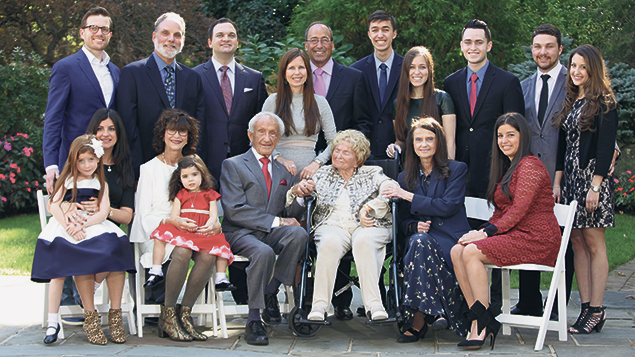
Was it painful every time he talked about what happened to him and his family? Was it somehow cathartic? Was it both? Or something else? Was it healing, or was it just ripping off the same scab every time it grew back? It’s complicated. “I think that there was some catharsis, but he was haunted by what happened to him every day,” Mr. Levine said.
“For my grandmother, it was far better not to talk about it. My grandfather was always the strong guy, it seemed, but I realized after her death that she was the stronger of the two. She was able to cope better. My grandfather reached a point where no matter what you were talking about, somehow it came back to the Holocaust. My grandmother was able to deal with it better.”
Despite what they’d lived through, both Mosbergs were able to find real joy in their postwar lives. “They felt tremendous joy with their first child, and with each child, and when my mother, who was the first to get married, got married, and with every grandchild. It was their revenge, a sign of rebirth, of continuation, of Hitler not succeeding.
“My grandfather was not able to have his bar mitzvah, because of the war, and we shared a birthday, so I had my bar mitzvah with him,” Mr. Levine said. “My mother said that we’d do it together, and my grandfather said that would be fine as long as I do all the work.
“It was very special. It was a rosh chodesh service in the Sheraton in Parsippany. It was a full house, with so many survivors — and I can think of only two who are left.”
How did his grandparents keep their faith after what they lived through?
“For my grandmother, I think that faith was something that just was in her,” Mr. Levine said. “She was honoring her father, who remained Orthodox after the war. And for my grandfather, keeping a kosher home was in honor of his mother. She was a widow when she was in her 40s, in Plaszów. Her hair turned white, and it made her look a lot older. My grandfather was able to get her hair dye, and he said, ‘Please, put this in your hair.’ She put it in her handbag, although she never did put in her hair.
“He was able to steal a piece of meat from the SS for her. He brought it to her, and put it in her mouth, and said, ‘You have to eat this.’ And she spit it out and said, ‘For my parents, I will not eat it.’
“So he kept a kosher home, to honor her.
“He was culturally and spiritually Jewish, he was a Zionist and a proud supporter of Israel, but he was not religious. That was ripped out of him. To his dying day, he missed his parents and his sisters and his other relatives who were murdered. And after she died, he missed my grandmother with his whole heart.”
In the final chapter of Mr. Mosberg’s life, he was able to tell his story in ways that reverberated through time and across generations. Although telling it sometimes came at great personal cost to him, it adds to the world’s knowledge of what genocide means. It gives the abstract idea of the Holocaust and survival a real face, and it helps work toward the goal of never allowing such evil to be unleashed on the world again.




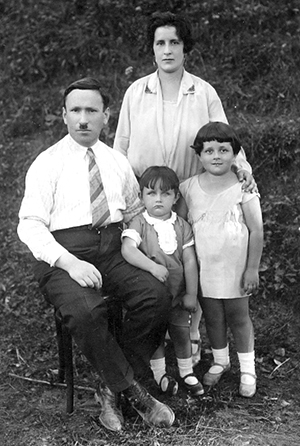
comments